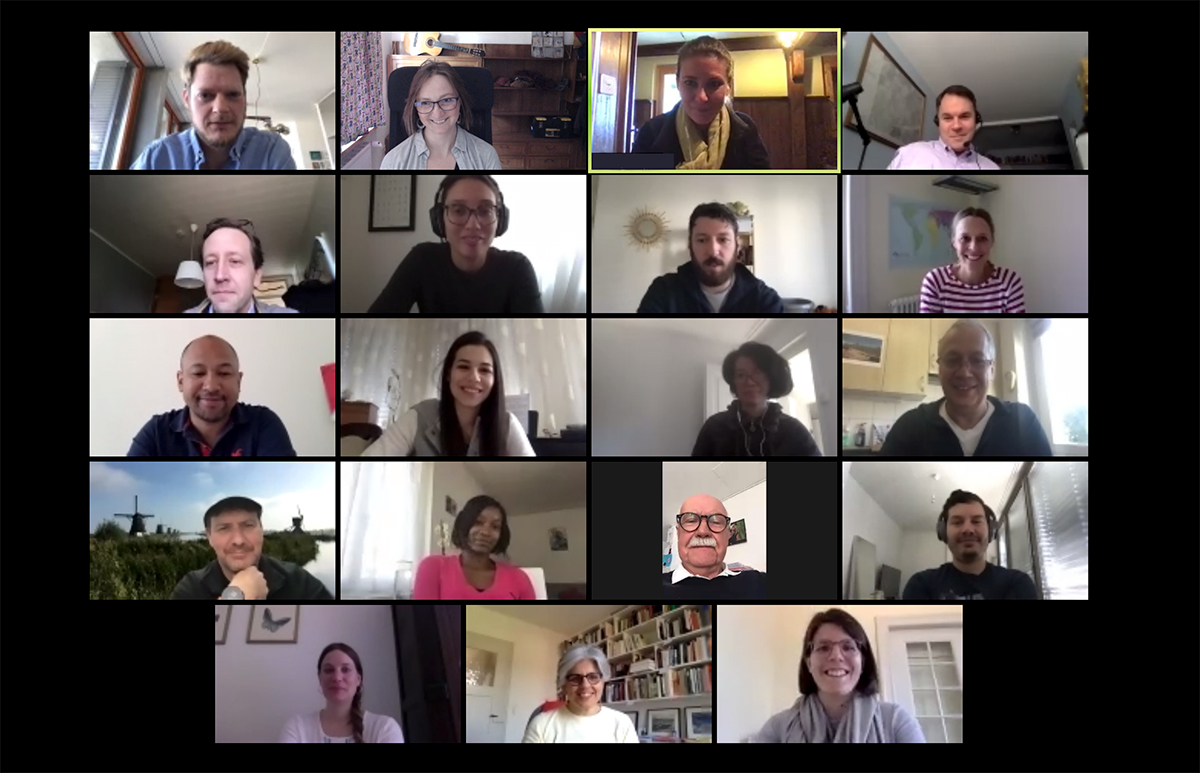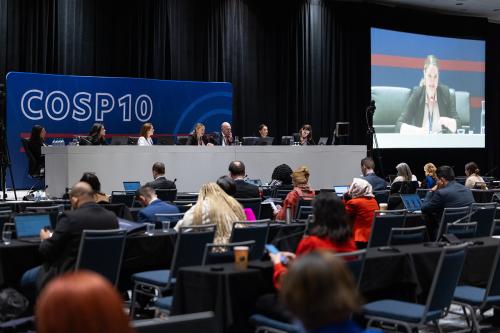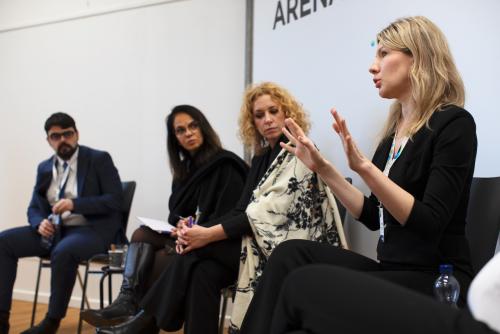COVID-19: What does “business continuity” look like at the Basel Institute?

The agility that we pride ourselves on at the Basel Institute is often tested, not least by political turbulence in our partner countries. Beyond its implications for society and its catastrophic impact on victims and health systems, the coronavirus pandemic is the biggest test for us so far.
We know we are anything but alone in this, and – as with corruption – it is clear we can only come out of this in a good way if we share our experiences and help each other. In this spirit, we wanted to give you a sense of how we are adapting in these early days, with the generous support of our partners and donors, and our feelings for the future.
Life under lockdown
Our first priority is to ensure the safety of our people – our staff and their families and our colleagues in partner organisations. Our offices are closed and all travel has stopped. Some of our field staff have chosen to remain in-country, while others have been repatriated.
Second, like others, we are adapting to life under lockdown. There are definite challenges to teleworking in terms of psychological impact and productivity, particularly for those of us with children home from school. But like others, we are finding that video meetings work fairly well and, combined with our regular virtual morning coffee breaks, allow for a degree of human interaction. It is fair to say that we are using means of communication involving seeing each other more frequently than in the past, when we would mostly talk on the phone or write emails. Because we bumped into each other in the coffee room, in the hallway or during in-country trips.
Not attending meetings and conferences is difficult in a line of work where, because we often discuss highly sensitive matters which require trust, face-to-face contacts and relationships are important. And despite the current buzz about virtual training, it doesn’t match the buzz of students learning about corruption research with our Head of Governance Research Claudia Baez Camargo, or of trainees working together on a simulated money laundering case during a workshop led by ICAR’s Head of Training Phyllis Atkinson and her training team.
Notwithstanding, and without planning to do away with in-person trainings at all, increasing our virtual training capabilities has advantages. More anti-corruption practitioners can benefit from our capacity-building programmes, and at more flexible times. In fact, our Public Finance Management experts in Peru have already proven this: they launched the latest in a series of virtual courses for public officials just this week, with 800 new trainees joining the thousands who have benefited from these in the past. In addition, we have already seen a nearly 300 percent increase in activity on our eLearning courses and similarly increased demand for our Basel AML Index and Basel Open Intelligence tools.
Finally, less work-related travel helps many of us to clear our heads and to-do lists, not to mention stay healthier. And we have all seen the charts showing the wider environmental benefits of taking cars off the streets and planes out of the skies.
Whatever happens, we have learnt some valuable additional skills and ways of working to take forward into the future.
Remote working in low-tech contexts
In many of our partner countries in Africa, Asia and Latin America, digital systems – never mind remote working methods – are not widely available or used. This affects our International Centre for Asset Recovery experts the most, as it makes case mentoring and training a challenge to say the least.
- Files are often on paper, stored manually and shared in person.
- Computers and video conferencing equipment are insufficient or in some cases non-existent.
- Electricity and internet connections are unreliable and expensive or, for many staff who have returned to their homes in rural villages, simply unavailable.
- Our partners are often not used to communicating virtually. Many government staff in our partner countries don’t use professional email addresses, and computer skills are sometimes weak.
- In these contexts, personal contact is even more vital to maintain progress on cases.
But necessity is the mother of invention and, as one of our field experts points out, patience is her sister. The ICAR team are helping each other find creative ways to continue case assistance and mentoring, from photos of documents and drafts transmitted through secure file-sharing systems to – for relationship-building – social media. They are also finding more time to focus on preparing the institutionalisation of good practices through SOPs and manuals, building on insights from in-country practice for global policy recommendations, and helping partners introduce new technologies more efficiently and securely.
The crisis is revealing the value of our model of embedding asset recovery experts in partner institutions. Many are still in-country, and the trust built through this model will allow us to continue where we left it quickly as soon as restrictions are relaxed. And as we hope everyone is experiencing, relationships grow stronger when we face a crisis together.
Digital security challenges
Remote working raises numerous security challenges. Many of these are not new to our IT team because the nature of our work has always required that we pay great attention to this. Still, it’s a good time to review questions like:
- How do we control remote access to case files and other data internally and with partners?
- How do we ensure the security of messages transmitted over email or instant messaging platforms, if that’s what’s commonly in use in our partner countries?
- The mixing of professional and personal communication and devices – is it ever OK to use a personal WhatsApp account for work-related information or to store confidential files on a personal phone?
- How secure are off-the-shelf video conferencing platforms and how can we use them in a safe way, in particular with respect to retaining control over data?
- How do we deal with the fact that criminals are also moving online, and protect ourselves and our partners from the risks of hacking, phishing and cyber fraud?
Our IT team is working hard to find technical solutions in addition to our regular secure processes and communication systems. But security is about people, not just technology, so our emphasis is on pragmatic solutions that work for us and for our partners too.
Higher stakes for compliance and Collective Action
Practicalities are less of an issue for our Compliance and Collective Action team, as most companies and organisations are well set up with technology and remote collaboration.
But Gemma Aiolfi, Head of Compliance and Collective Action, says that dealing with a crisis can reveal weaknesses in systems when it comes to preventing corruption. These could come from weaker controls through remote working, the fast adaptation or bypassing of regular systems and procedures, or the postponement of vital compliance training.
There will be a shake-out in some industry sectors. Economic effects will likely increase competition for business as firms struggle for survival and employees strive to demonstrate their value in bringing in business. This could result in sacrificing resources that would have been allocated to the compliance function. In the worst of all scenarios it could also lead to companies reverting to old bad practices of trying to win contracts through unfair means.
The crisis is also an opportunity for companies to develop better preparedness for pandemics and other catastrophic risks. Considering what this means for anti-corruption and corporate governance will be key. They should also consider engaging in Collective Action to supplement their individual compliance efforts more efficiently.
Pressures on public governance and health systems
The pressures caused by the pandemic and governments’ resulting measures are, as one colleague in Mozambique says, raising the stakes for all of us and teaching us to live with uncertainty.
That couldn’t be more true for health systems of countries in which corruption is widespread. Health systems are known to be particularly exposed to high-level corruption risks. In these times, it is even more vital that health services and equipment are provided fairly – not to those who bribe or attempt to profit from the emergency by hoarding equipment or diverting donations of monetary aid and equipment.
We hope that our Public Governance team’s pilot intervention targeting social norms in Tanzania’s health system will be able to go ahead, as research projects such as these are crucial to designing more effective anti-corruption interventions. And that Claudia Baez Camargo is right that the crisis, in provoking us all to rethink governance, will teach us all the value of public goods.
A boost for anti-corruption action against illegal wildlife trade
The pandemic has attracted attention towards illegal wildlife trade, as it becomes clear that COVID-19 was a direct result of the illegal trade in live animals. The pandemic makes a powerful argument that addressing the world’s fourth-largest organised crime is not just about conservation or animals in a faraway land, but has direct implications on human health, security and the economy.
We welcome commitments by countries including China and Vietnam to crack down on the trade and consumption of wildlife, but caution that the crux is how effectively these bans are enforced. Key will be to tackle the corruption and financial crime that fuel the illegal trade by bringing together law enforcement with the companies and financial institutions most closely affected by the trade.
Adapting together in our connected world
These are just some initial thoughts, and we hope that our sharing of this experience is useful for others who face similar challenges. We will continue to work with our partners as they also try to stay on track with the vital work they are doing to fight corruption and financial crime, and to make the world a better place. Because if we have learned anything from this crisis, it is that we are all connected, for better and for worse.




